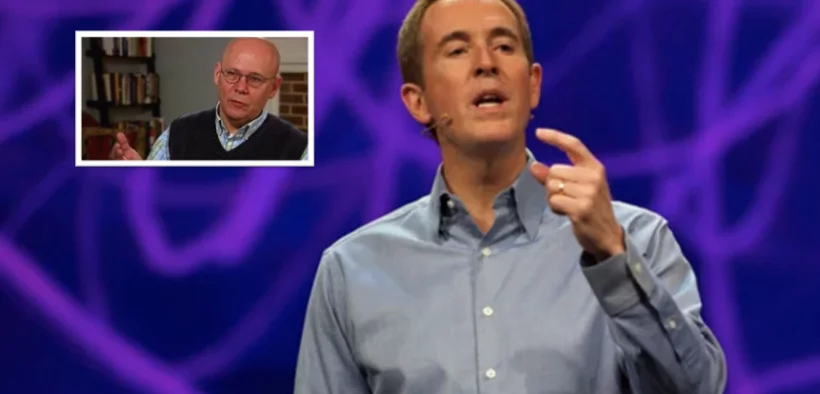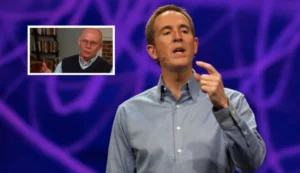How Do You Handle A Problem Like … Andy Stanley?
He has a habit of “walking back” misstatements, but how do you walk back an entire conference?

OPINION–Andy Stanley and I are almost exactly the same age, and I met him when we were both just out of college. Andy’s sister Becky and my sister Jackie were housemates at the University of Georgia in the early 1980s, and that brought our families into cordial, though not intimate, relationship. I have fond memories of attending parties at the Stanley home in the posh Vinings area of Atlanta, a short stroll from the Chattahoochee River.

It was easy to see even then that Andy was gifted. He lit up a room. He bent the conversation the way he thought it should go — and that was usually in the direction of Jesus. Many of us who admired him in those days went happily along. He was a fun and interesting guy to be around.
Because of those early interactions, I followed his career with interest. Andy’s famous father, Charles Stanley, was pastor of First Baptist Church Atlanta, one of the largest and most influential churches in the nation. Charles Stanley’s In Touch Ministries today takes in more than $130 million a year.
Andy was his father’s heir apparent as pastor of the church. Part of his preparation was to lead the first satellite location of First Baptist in 1992. Within months, that location had more than 2,000 in regular attendance.
But it was about that time that the public became aware of troubles in the elder Stanley’s marriage. Many members of First Baptist called for him to resign. Those outside the church who believed that Charles Stanley’s stature reflected on the entire Southern Baptist denomination, if not all of evangelicalism, also called for him to resign.
Andy Stanley was one of those who thought he should offer his resignation. He later told CNN (in a fascinating profile) that he thought the church would not accept his father’s resignation, but that the church should have the choice.
But Charles saw Andy’s position as a betrayal, and it caused a breach between father and son. In 1995 Andy left First Baptist to form North Point Church. North Point went on to become one of the fastest growing and now one of the largest churches in the nation. Today, the elder Stanley is gone. He died earlier this year. And the son has risen to a similar rock-star status in the evangelical ecosystem. Andy Stanley has his own media presence, and he’s the author of more than 20 books.
(I did an in-depth interview with him for WORLD, about his 2022 book Not In It To Win It. I found the book to be excellent. You can find that interview here.)
But the current controversy over his “Unconditional” conference is not the first time Andy Stanley’s miscues have gotten national attention, at least among evangelicals. In 2012, Stanley used the example of a gay couple attending his church that caused many to believe he was affirming same-sex relationships. He later said he was not. He was simply acknowledging the “tension” inherent in dealing with broken people in a broken world.
In 2013, Stanley preached at President Obama’s pre-inaugural worship service and called the president our “pastor-in-chief.” He later admitted that he understood why many Christians would have concerns about that remark.
In 2016 he called parents “stinking selfish” for choosing small churches that don’t have robust youth programs over large churches that do. Once again, he walked back those comments later. “As much as I wish folks would listen to the entire message,” he told Christianity Today. “It really doesn’t diminish the absurdity of what I said.”
All of these miscues motivated a prominent evangelical theologian to tell me, “I think Andy is fundamentally sound, but sometimes I wish he would just keep his mouth shut.”
With all of this context, let us now come to Stanley’s “Unconditional” conference. The first thing we need to acknowledge is that what he said and promoted with this conference, with premeditation and forethought, was not a slip of the tongue by a fluid speaker in the heat of the moment. Love it or hate it, it was not a spontaneous event or an off-the-cuff remark.
“Unconditional” was billed as a conference “for Christian parents with LGBTQ+ children, ministry leaders, and health care professionals.” I have a hard time finding fault with that purpose. Such a conference could meet a real need in the church.
But Stanley and the conference quickly went from acknowledging the need to affirming the behavior. He invited speakers who were openly gay and gay affirming. He said that for gay men and women to remain celibate was “not sustainable.”
(To read MinistryWatch’s complete coverage of the event, click here.)
Such comments drew immediate reaction from a wide variety of evangelical leaders. Al Mohler wrote in WORLD that Stanley had departed “from historic normative biblical Christianity.”
Stanley responded, saying Mohler’s “version of biblical Christianity is the problem.”
Sam Allberry, who has written and spoken a great deal about this topic, gave perhaps the most trenchant critique of the conference when he wrote for Christianity Today: “When any leader suggests to me that chaste obedience to Christ in singleness is not sustainable, he is saying the very same thing to me that the Devil says.”
Denny Burk, president of The Council on Biblical Manhood and Womanhood and a professor at Southern Seminary, criticized Stanley’s message.
“It’s an anti-Christian message because it tells sinners that they don’t need to repent of their sin in order to be a Christian,” Burk said. “It’s subversive because the message is cloaked in a veneer of Christianese. It’s designed to persuade the consciences of Christians of a message that is incompatible with basic Christian teaching.”
My friends and former Colson Center colleagues John Stonestreet and Tim Padgett wrote an excellent critique of the conference for their website BreakPoint.org, which we reprinted here.
Stonestreet and Padgett make a point I had not seen in elsewhere, but which is vital to this conversation, and that is that you can’t uncouple theology from pastoral care. One of the speakers at the “Unconditional” conference suggested that we needed to unhitch theology from pastoral care to meet people where they are.
But Stonestreet and Padgett said the point of pastoral care is not merely to meet people in their place of brokenness, but to lead them to a place of healing. They make the excellent point that pastoral care unhitched from theology is neither pastoral nor caring.
Given all that, what are we to make of Andy Stanley?
I think that depends on what happens next. To Andy’s credit, he has a habit of walking back errors in speech, as we saw above. True to form, he has attempted to do so again, saying the Sunday after the conference that he indeed believed the biblical norm for marriage was one man and one woman. That was a welcome clarification.
However, he doubled down on those who criticized the conference, saying his critics were trafficking in “misinformation.” The internet being what it is, it is impossible to say that he’s wrong. Perhaps some of his critics are trafficking in misinformation. But he completely failed to address the legitimate, biblical, thoughtfully expressed concerns of Mohler, Allberry, Stonestreet, Padgett, and many others.
All of this takes me back to where I started: The young Andy Stanley I knew then was a wonder to behold. Passionate, on fire for Jesus, full of potential to change the world.
But the word “wonder” has two meanings. It can mean something beautiful, generating surprise and admiration. Wonderful.
It can also mean doubt, concern, uncertainty, skepticism – qualities not so wonderful in an age that requires clarity.
It is my hope and prayer that Andy Stanley will reflect on what he has wrought. If he fails to do so, he might become a wonder of a different kind.
As in “I wonder what happened to Andy Stanley?”



